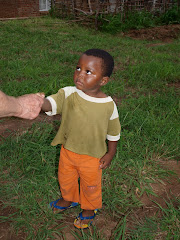
Journalist Fidelis Zvomuya, of Inter Service News Agency (http://allafrica.com/stories/201007280006.html), recently wrote, “According to UNAIDS, Zimbabwe has over 1,3 million AIDS orphans. About 100,000 of them live on their own while others live with their extended families.
It estimates that between 110,000 and 140,000 children aged between 0 to 14 years are living with HIV - who mostly live in rural areas.
And the country does not have enough antiretroviral (ARV) drugs to comply with World Health Organisation recommendations on providing treatment to people with HIV. According to Dr Tapuwa Magure, CEO of the Zimbabwe National AIDS Council, the number of Zimbabweans in need of ARVs has increased to 570,000 from 350,000.”
“Currently about 200,000 people whose immune systems have been severely weakened are on ARVs. This number includes children”, Magure said.
“But Tanya Weaver of the American Foundation for Children with AIDS, said Zimbabwe receives little HIV/AIDS funding support from any of the major donor initiatives. The country receives approximately four dollars per HIV-positive person per year.”
“In contrast, neighbouring Zambia, which has a similar rate of HIV prevalence, receives around 187 dollars per HIV-positive person annually from foreign donors,” states Weaver.”
Zvomuya quoted a medical doctor at Guruve Hospital who said, “In most rural areas, children with AIDS are generally considered a lost cause.
Treatment, to the extent it exists, is limited to adults, for whom antiretroviral therapy is cheaper and easier.
Specialized and costly tests are needed to determine whether a child under 18 months is infected, although treatment can begin based on symptoms alone.
Children are also more complicated to treat, partly because their medication must be constantly adjusted as their height and weight change. And paediatric drugs cost more than adult medication until recently, up to three times as much.
The doctor added, Half of all untreated HIV-positive infants die before the age of two for lack of medication that can produce transformations seemingly overnight.”
These are some of the realities of the situation responders in Zimbabwe are dealing with.
The challenge is multi-tiered and so must the response be. We are doing what our partners equip us to do by means of a Home Based Care program operating out of a hospital in the rural Northeast of Zimbabwe.
Our vision is to broaden that response into other affected areas of the country.
One of the ways that will be accomplished will be by means of networking and strategic partnerships with sister HIV/AIDS response initiatives presently underway within Zimbabwe.
Internationally, one of the most vital components to response expansion will be the ZITA Alliance that is being formed in North America.
For more information, please write budwestcoast@shaw.ca.






No comments:
Post a Comment